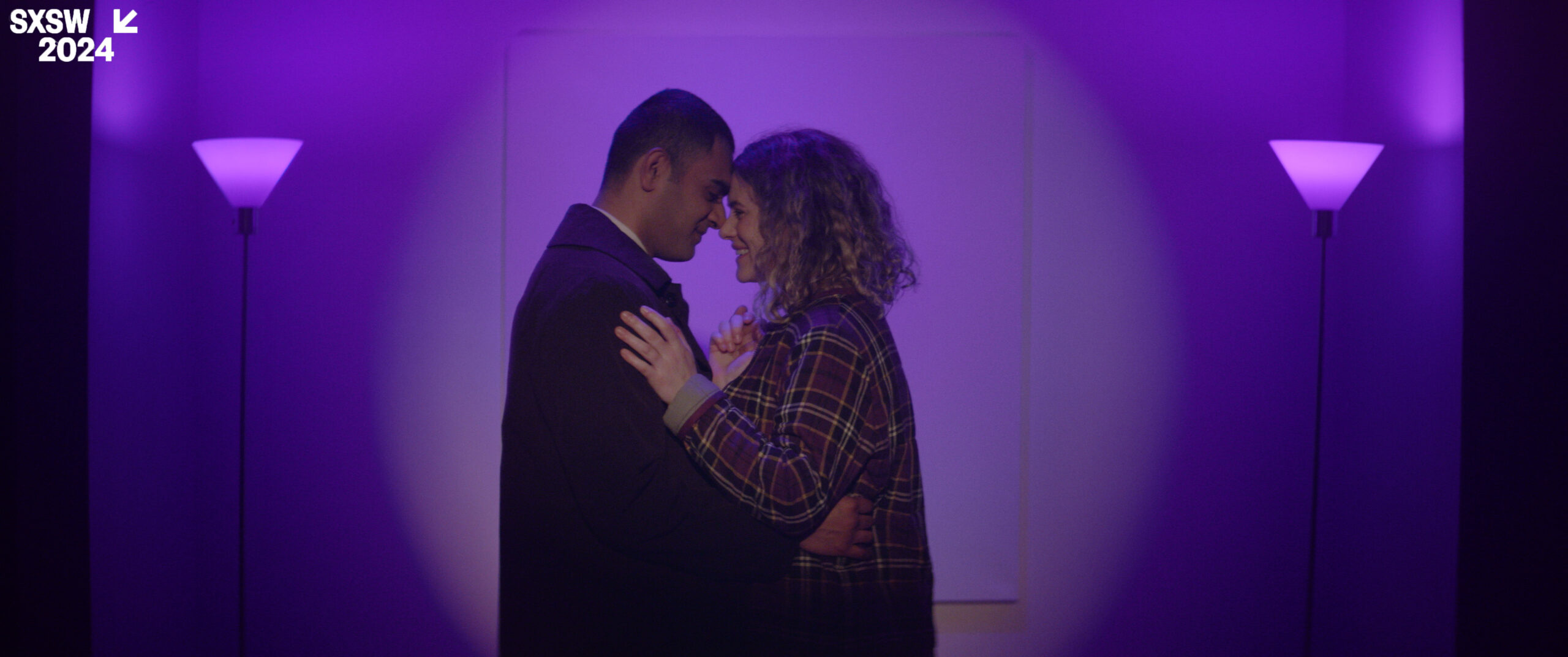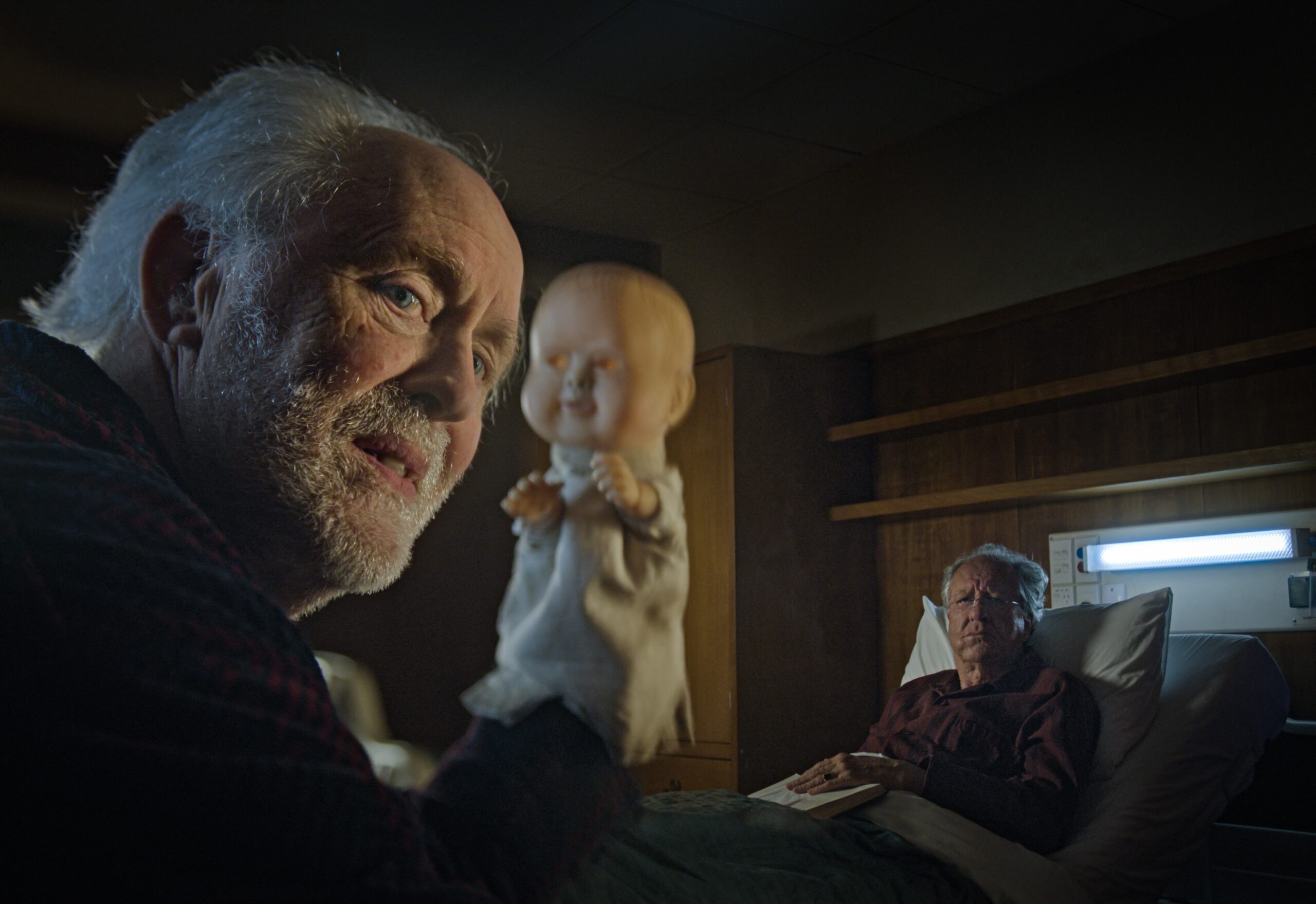Title: Laughter
MPAA Rating: Not Yet Rated
Director: Martin Laroche
Starring: Christine Beaulieu, Alexandre Landry, Micheline Lanctot
Runtime: 2 hr 4 mins
What It Is: After a brutal civil war in near-future Quebec, Sylvia (Beaulieu), a survivor, works at a nursing home and lives with her partner at home. She is faced with the aftermath of her trauma, often reliving the moment she almost died and watched her previous lover be shot on front of her atop a bed of corpses in a mass grave. Others are left disoriented, delusional, and/or damaged in the face of the quiet front of their country in contrast to the previous life of war they had lived.
What We Think: What a difficult film to navigate. Prepare for me to write this like a headless chicken, so–
To those unaccustomed to arthouse films, this would by far be the easiest to slap the ‘pretentious’ label on and call it a day. My initial instincts, as they always are, is to give a film like this second, third, and fourth waves of thoughts and connect the dots until possibly I come to a lead as to how it all connects. It’s that kind of film. It’s the kind of film that approaches and leaves you at its disposal rather than the other way around, a film confident about futility, and the futility of considering futility and back again. The display of an unpredictably bent reality will either inspire, frustrate, confuse, or all of the above. We bounce from character to character as they spiral in some sort of way. As to whether or not this was a brilliant way to spend our time in a melancholic, post-war headspace is incredibly debatable as well as individual. It’s almost as or at times more disorienting as some of Michael Haneke’s work, Code Unknown for example where there are many surfaces to a film that is the viewer’s task play psychotherapist in order to unpeel its meanings, choices, layers, etc. The cause-and-effects are overwhelming, in that sense.
The film’s setup lies within the logic of films like Gummo, where it is about how the state of the characters are left after an event rather than the happening of the event itself. ‘The worst is already over–now what?’ sort of ordeal. There are a plethora of sequences, shots, actions, and settings that fall in line with other movies with a difficult if not intrinsically independent film logic–in other words, movies like this play by their own rules. “A chair may or may not actually be (just) a chair” is another way of putting it. I often love to see films creating their own language like so in order to force the audience to question the meaning of things in the bigger picture; they are very exciting puzzles to put together, usually tied by an emotional standard.
Switching gears: the catalyst of the plot itself is extremely displacing and results in many leads. In one moment, you’re in a dance musical, in another, you’re in a surreal space where nothing makes sense, characters literally mirror each other but their connections are far out and subtle, if not leaving you stranded. Some moments are visceral, but for most of the film I found myself over the idea of what it could be communicating about traumas and theme of surreality and juggling responsibility and sanity.. I eventually stopped trying to make connections. Don’t get me wrong, I was in the very least interested. It’s a pretty film: its editing, scenes, and pacing, although at times iconoclastic, could be very personal and emotional. It is at times creepy, at other times poignant and intellectual. The cast is absolutely brilliant and brave for taking on roles that demand so much not only physically and mentally, but roles where the essence, core, and motivations of the character can be very hard to spot or understand. I like it when films don’t demand that storytelling should make all sense in this sort of light, but at the same time it could be so obscure and sporadic that there were times I was over it entirely, and that reaction is entirely personal itself. That’s what makes this a tricky film to read.
Moments are, in the most general sense, Lynchian in the addition of surrealism used to designate certain emotional beats. The interesting thing is these emotional beats are hard to read for a film that uses a new-wave sort of dream logic to where it isn’t the logic of dreams so much as conflicting psyches. You bet this is one of the most quietly chaotic films you’ll see all day, another issue I can assign to it is that despite its outlandish delivery, unexplained characters, mysterious events, and overall call to challenge the sensitivity of the viewer, it still does not make itself as much of an impression in my head as it would other movies that take on the ilk of bypassing common film logic. I remember most elements and their places and times, and yet it takes on so much and makes me think so deeply that I can’t help but run around in circles about it, between liking it for its audacity, or criticize it for the attempt being less than impactful on me personally. I can understand what its direction is and its intention, but there is only so far I can personally go for a film that I feel I have absolutely no personal stake in.
Thing is, this movie is about a fictional war, a fictional genocide, and how it effects the characters. How “laughter,” per se, is a reaction to extreme displeasure. That’s sort of a given. And yes, it makes way for some amazing scenes showcasing the radical ends to human nature, a reaction after reaction–everyone can agree that the cast amazing and Beaulieu’s work is stunning as we see her go through the motions and mature past the events that took everything from her. At the same time from the source of the story itself, I can’t really attach myself to, and again that’s a personal thing. It’s not that I can’t relate to the characters, sympathize with their mental states, internal conflicts, or plights overall, but simply that the very subject of coping and existentialism is itself attached to something that felt so contrived to me. Which I admit may be too pragmatic or judgmental of a take considering literally all of fiction is contrived, but I simply couldn’t bring myself to have any emotional connection to a movie about a civl-war-genocide that never happened. It’s insinuated everything that happens in the movie is attributed to this event and I can’t help but think in my brain there are a million wars and genocides that have happened that deserve to be represented on a major platform. It’s a controversial take for a controversial movie; I can go in circles with myself forever on this, I might end up disagreeing with myself in the future, but for now I just can’t see it as much of anything besides watching characters scrambling underneath too big of a hypothetical. A much primal defense on my behalf would probably be that I simply couldn’t see this film saying much about anything except for reaction, rather than giving much weight to the causation as it relies so much on it.
Our Grade: C-, Surrealism is one of my favorite everything’s–favorite art movements / genres to study and consider. I can spend hours thinking and talking about surrealist media, but my personal opinion at the moment comes to an admittedly unfortunate binary: either something is executed because it is about something, or nothing at all. I could honestly give this film a C, C+, or a B-, and nothing would change. It is not only often stranded in reality but gives me nothing to be stranded for in a false if not random scenario with little stakes and world building. I could piece together all of its pieces and interpret its anarchical language until my hair grows gray… I will still be just as unaffected. It just didn’t do it for me. It was a respectable miss, neither too eccentric or not eccentric enough. Perhaps for my liking, it was simply too emotionally and visually ambitious for a plot that takes my mind nowhere but a tired dead end. My last statement to you, dear readers, is that I don’t want to turn anyone off to see this movie. Watch on your own volition. I think in this case this was more of a personal digression than a surface-level review for a very unpredictable experience, and in the end, you have every reason to still be intrigued for it. Whether or not it hits you where it means to is all on you.



